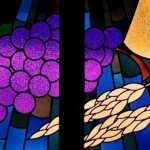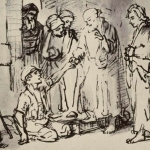Sermon / August 21, 2016 / Luke 13:22-30 / We Have it in Writing / Pastor Terry Defoe

Luke’s Gospel chapter 13. I’m reading verses 22 to 25:
22 Then Jesus went through the towns and villages, teaching as he made his way to Jerusalem. 23 Someone asked him, “Lord, are only a few people going to be saved? He said to them, 24 “Make every effort to enter through the narrow door, because many, I tell you, will try to enter and will not be able to. 25 Once the owner of the house gets up and closes the door, you will stand outside knocking and pleading, ‘Sir, open the door for us.’ “But he will answer, ‘I don’t know you or where you come from.’ (N.I.V.)
Grace, mercy, and peace to you, from God our Father, and our Lord and Savior, Jesus Christ!
Our text this morning describes an event that happened in the last days of Jesus’ ministry. Jesus was on his way to Jerusalem – on his way to a cross where he would die for the sins of the world. As He traveled towards Jerusalem, he stopped off at many places along the way. And at each place, he taught the people about the Kingdom of God. He cleared up confusion about spiritual things. He answered their questions. He spoke the truth, and he spoke it in love. In our text today, someone wanted to know how many people were going to be saved. In the next few minutes, we'll have a look at Jesus' answer. May God bless our consideration of his Holy Word this day!
There’s no doubt about it. Jesus of Nazareth was a “people person.” He liked to be around people. He was a wonderful teacher who was able to engage people’s attention. Even though he had beenn given a huge task by Heavenly Father – and that was nothing less than the salvation of the world – Jesus had time for people. Jesus was very different from the Jewish religious leaders. They were distant and uncaring. Jesus, on the other hand, got involved with people – he got involved with their problems and their questions. During his short three-year ministry, Jesus built bridges to people. He built relationships and friendships. He taught the people about salvation and faith.
One day, near the end of His ministry, someone asked Him a question. The person wanted to know if only a few people were going to be saved. So let me ask you. What does the word “saved” mean? Bible scholars tell us that the word had various meanings back in Jesus’ day. It meant to be preserved from peril. It meant to be kept alive, protected from want. Being saved also meant a state of good health. Most importantly, being saved meant that a person’s “inner being” was preserved from the danger posed by sin. Jesus taught that only those who were “saved” would gain entrance into the Kingdom of God.
So the question was asked. And Jesus gave His answer. So, was it true that only a few people were going to be saved? Jesus’ answer was “Yes!” Now why would that be? Because, according to Jesus, the door to heaven is narrow and not everyone is allowed through. When you think about it, we human beings have an amazing ability to deceive ourselves. We human beings have the ability to convince themselves that something is true when it’s not true at all. The religious leaders of Jesus’ day were masters at the art of self-deception. And to make things worse, they taught these untruths to the people – and worst of all, they did it in the name of Almighty God!
The Jewish religious leaders emphasized outward acts. Jesus, on the other hand, emphasized inward faith. The Jewish religious leaders emphasized doing. Jesus, on the other hand, emphasized believing. Throughout his ministry, Jesus spoke of the importance of a saving relationship with God. He said that such a relationship is only made possible by the grace of God. A saving relationship with God is initiated by the Holy Spirit, who works through the word, Holy Baptism and Holy Communion. Once it has begun, a saving relationship with God is then strengthened through fellowship with God and his people in the church.
God established a saving relationship with us at the time of our baptism. He strengthens that relationship through the bread and wine of Holy Communion. He strengthens that relationship through the fellowship of the church. Jesus tells us to make every effort to enter the narrow door to the Kingdom of God. He tells us that we will need to keep on making that effort all our lives. The door to the Kingdom of heaven stands wide open and Christ Himself is the door. Believers let God remove their sins and their wrongful pride. Believers let God take away their self-righteousness. The door to the Kingdom stands wide open for all those who trust God and his Son Jesus Christ. We make it through that door only by the grace and mercy of God.
When we die, that door is closed. In other words, when death comes, it's too late to believe. And when God’s Son returns to this earth at the end of the age, it will be too late to believe for the whole human race. And when that door is closed, as our text this morning says, there’s nothing we can do to open it. In our text this morning, Jesus warned that some people who thought everything was fine in their lives, spiritually speaking, were going to be shocked when they found the door to the Kingdom closed to them. Some people, according to Jesus, were clinging to a false hope. Some people had allowed themselves to be deceived. Many would try to enter the door to the Kingdom, Jesus said, and would not be able to. The owner of the house – a reference to God the Father – would close the door and that would be it! To add insult to injury, the owner of the house would say to those knocking at the door – “I don’t know you, or where you come from.”
In the Bible, the verb “to know” has a special meaning. It means more than “knowing about” someone. I know about Brad Wall. But I don’t know him in the Biblical sense – in other words, I don’t have a relationship with him. In the Bible, the verb “to know” implies a relationship between people – a closeness, a mutuality. So when the owner of the house – that is, when God – says that he doesn’t know the people knocking on his door, it means that he doesn’t have a saving relationship with them. It means that those knocking at his door aren’t connected to him in any way. In the Scriptural sense they are not “saved.”
The Jewish religious leaders thought they had an “in” with God because they were descendants of Abraham. They thought they were going to be saved by virtue of their religious and national “pedigree.” They thought they were going to be saved by what they did for God – that is, by their keeping of the Law. The thought that they might be excluded from his blessings never crossed their minds. That’s why Jesus’ words that day were so shocking.
The Jewish leaders’ self-deception still exists today. Perhaps you’ve heard people say,
• “Well, Canada is a Christian nation, so I must be a Christian, too. I don’t believe in all this talk about Jesus and the cross, but I’m sure that God will take me in.”
• Someone else might say, “Well, my dad (or uncle or grandfather, or just fill in the blank) was a pastor (or an elder, or church worker of some kind). So I’m sure that God will have a place for me in heaven.”
• Still another might say, “Well, I’m not much of a church-goer, but I’m certainly better than all those hypocrites in the church. And I know that God loves everyone. How could a loving God deny a place for me in heaven? I’m sure I’m OK with God.”
Some people in Jesus’ day were willing to argue with God about their exclusion from the Kingdom. They argued that they “ate and drank” with the Lord. In other words, they were physically close to Jesus, during his earthly ministry. But that’s all. They never believed in him or lived by his standards. What they saw in him and what they heard from him had no effect. They didn’t let God’s word change their hearts. They didn’t let God’s Word forgive their sins. They had no relationship of trust and faith in him. In the Holy Scriptures that means that their faith wasn’t the real thing. They were deceiving themselves. Some will be excluded from God’s Kingdom, but many others will be included. Those who thought they would be first in the Kingdom of God – people like the religious leaders -- would be last. And others would be first.
So. The question: "Will only a few people be saved?" The answer, unfortunately, is “Yes.” Some – the Jewish religious leaders are a very clear example – who thought they were a “shoe-in” for membership in God’s Kingdom -- would be excluded. And others, those who had long been on the sidelines, would be included. Think about it this way. Jesus was sent first to the people of Israel. The people of Israel were first to hear his words, they were first to see his miracles, and they were first to experience his compassion. They saw him die on the cross. They were confronted with the empty tomb. But very few Jewish people believed in him. Very few were willing to allow God to remove the obstacles that blocked the door to his kingdom. Very few were willing to let God take away their pride in religious accomplishments. But others – many of them Gentiles, non Jews – were willing to let God usher them through the narrow door into His Kingdom. On the surface, this seemed unfair. But when you think about it, it was – and is – eminently fair and just.
Human beings have an amazing ability to deceive themselves – especially when it comes to matters of faith. According to Jesus, self-deception in spiritual matters has the potential to exclude people from God’s Kingdom. Here’s the bottom line: not many are willing to receive God’s salvation on His terms. They think they know better than the Lord. They don’t have a relationship of faith with Him. They don’t believe his word of forgiveness and life and salvation. By their actions and their attitudes, they show that they have spurned his grace. And, sadly, their place in the Kingdom of God has been taken by others.
The Scriptures are clear. Entrance into the Kingdom of God happens by faith, by grace, through God’s Holy Word and the blessed Sacraments. We can take comfort in the fact that God doesn’t want anyone to miss out on his blessings. We can take comfort in knowing that God has gone out of his way to bring salvation to everyone. He sent his Son to die on a cross as payment for all human sin. He raised his son from the dead to show that his son’s sacrifice was sufficient for everyone. God sends his Holy Spirit to spark faith in every human heart. And He has established His church as the place were word and sacrament ministry takes place.
Our text this morning is saying this:
• Trust him – on his terms.
• Live for him – according to his Word.
• Let his Holy Spirit work in your heart – every day.
• Let him forgive you – and give you a fresh start in life.
• Let him guide you using his roadmap – the Holy Scriptures.
• Let him discipline you when you wander from the straight and narrow.
Do these things and I can assure you that you will hear his “Well done” on the final day. We have his Word for it – as a matter of fact, we have it in writing!
This morning, we’ve been talking about the danger of false hope. We’ve pointed out that certain things are absolutely necessary if we are to be saved and come to the knowledge of the truth. Other things are secondary. Here’s an example that points out the difference between what's not that important and what's absolutely critical.
A woman bought a parrot at a pet store, but she returned it the next day.
“This bird doesn’t talk,” she told the store clerk.
“Do you have a mirror in his cage?” the clerk asked. “Parrots often start talking when they see themselves in a mirror.”
The woman bought a mirror and left. The next day she returned – the bird still didn’t talk.
The clerk asked, “Do you have a ladder in his cage? Parrots love ladders and a happy parrot is a talkative parrot.”
The woman bought a ladder and left. The next day it was a swing. That didn’t help either. Soon she returned to the pet store and reported, “The parrot died.”
The clerk sympathized. “I’m sorry. Did he ever say a word?”
“Yes,” the woman answered, “Just before he died, he said – in a very weak voice – ‘Don’t they sell any food at that pet store?’”
The religion of many people today is a religion of mirrors, and ladders, and swings. Those religions have all kinds of nice things but they don’t have what people really need – they don’t have true spiritual food, the bread of life, Jesus Christ. So people starve spiritually. They perish in their sins. Christ is the spiritual food we need. In his Word, he brings us the bread of life. In the Sacrament of Holy Communion, his very body and blood are offered to us with the bread and wine. May we always be willing – by the enabling of the Holy Spirit – to receive these things from God. And may we also be willing to share these blessings with those around us. In Jesus’ name. Amen.
Let’s Pray – Dear Heavenly Father: Build our faith on the solid rock of your word, rather than on the shifting sands of human opinion. We thank you for establishing a relationship with us through Holy Baptism. We thank you for strengthening that relationship through Holy Communion. By your Holy Spirit, establish and maintain a true saving faith in our hearts. In Jesus’ precious name we pray. Amen.


